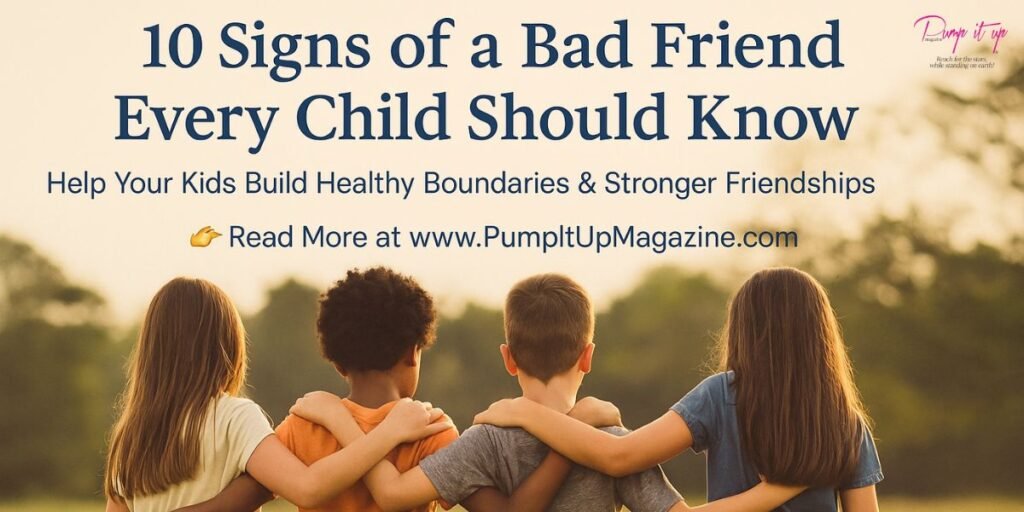As parents, educators, or caregivers, one of the most powerful things we can do is help children navigate the complex world of friendships. While friendships are essential to emotional development, not all of them are positive. Teaching kids the signs of a bad friend empowers them to protect their mental health, set boundaries, and develop healthy, lasting relationships.
At Pump It Up Magazine, we believe that emotional wellness for children begins with awareness. This article offers practical, easy-to-remember red flags that help both kids and adults recognize toxic behavior early on.
Warning Signs of a Bad Friend:
1. They disrespect your boundaries
True friends honor your space and choices. A bad friend constantly pushes your limits or ignores your comfort zones.
2. They tease or hurt you regularly
Frequent teasing, bullying, or sarcastic comments—especially when they continue after being asked to stop—are major red flags.
3. They control your attention on demand
Do they get upset when you’re not available right away? Toxic friends often demand constant validation and attention.
4. They compete with you on everything
While a little friendly competition is healthy, constant rivalry creates stress and tension, not support.
5. They only show up when they need something
A good friend is there in good times and bad. If they disappear until they need a favor, that’s a sign of selfish behavior.
6. They act different in public and private
Do they treat you like a friend in private but embarrass or ignore you in front of others? Consistency matters.
7. They pressure you into things you don’t want to do
Peer pressure—especially to engage in risky or uncomfortable behavior—is a serious issue kids should be taught to resist.
8. They make fun of your dreams
Healthy friendships nurture ambition. Mocking your goals discourages growth and confidence.
9. They get jealous of your success
Rather than cheering you on, they act distant, passive-aggressive, or even mean when you achieve something.
10. They judge or try to change you
A real friend accepts you. Toxic friends criticize your personality or try to mold you into someone you’re not.
Why Recognizing Toxic Friendships Early Matters
According to the Child Mind Institute, helping kids recognize toxic friendships improves their mental health, emotional resilience, and academic performance. Emotional intelligence is a lifelong asset, and early lessons create strong, self-aware individuals.
Let’s Raise Emotionally Strong Kids
Empowering kids means teaching them to recognize the signs of a bad friend and giving them tools to build healthy relationships based on mutual respect, kindness, and trust.

🌟 Want more parenting tips, confidence-building tools, and emotional wellness resources?
👉 Visit www.PumpItUpMagazine.com today.
Frequently Asked Questions (FAQ)
What are the signs of a bad friend?
Bad friends often ignore your boundaries, hurt your feelings repeatedly, compete with you, disappear until they need something, and make fun of your dreams. They may also pressure you, get jealous of your success, or try to change who you are. These are all signs of a toxic friendship.
How do I teach my child to recognize toxic friendships?
Start by having open conversations. Explain what healthy and unhealthy friendships look like, and encourage your child to trust their feelings when something feels off. Use examples they can relate to and role-play different situations to build their confidence.
Why is it important for kids to recognize bad friends early?
Recognizing bad friendships early helps kids build self-esteem, emotional intelligence, and strong social skills. It also protects them from bullying, manipulation, and long-term emotional damage.
What should I do if my child has a toxic friend?
Support your child without judgment. Ask how that friend makes them feel and listen carefully. Then guide them on how to set healthy boundaries, limit time with that person, or walk away if necessary.
Are some friendships just going through a rough patch?
Yes, not every friendship challenge means it’s toxic. Teach your child to look at patterns—if someone consistently hurts them or makes them feel unsafe or small, that’s when it becomes a serious concern.







